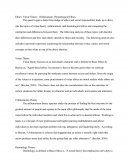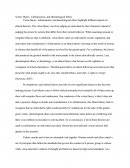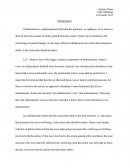Utilitarianism essays
Last update: June 2, 2015-
Session 5 Reading: Consequentialism - Utilitarianism
SESSION 5 READING: CONSEQUENTIALISM Chapter 9 - "Utilitarianism" ∙ Case example: Lockheed in Japan (1972) -- Lockheed makes payments to All Nippon Airways (ANA) and Japanese government officials to secure deal -- Included in this is a pledge of $1.6MM to Prime Minister Tanaka made by Lockheed manager Carl Kotchian -- Lockheed goes ahead with this since its business is in danger and it feels that these payments are simply a necessary factor in doing
Rating:Essay Length: 802 Words / 4 PagesSubmitted: August 1, 2011 -
Ethics: Virtue Theory, Utilitarianism, Deontological Ethics
Ethics: Virtue Theory, Utilitarianism, Deontological Ethics The quest to gain a better knowledge of ethics and social responsibility leads us to delve into the topics of virtue theory, utilitarianism, and deontological ethics and comparing the similarities and differences between them. The following analysis of these topics will describe their differences and how each theory attends to ethics and morality. The following analysis also includes a personal experience explaining the relationship between virtue, values, and moral
Rating:Essay Length: 714 Words / 3 PagesSubmitted: October 28, 2012 -
The Utilitarian Theory
The Utilitarian Theory Utilitarian theories hold that the moral worth of actions or practices is determined by their consequences. Utilitarians believe that the purpose or function of morality is to promote human welfare by minimizing harms and maximizing benefits. Utilitarianism theory accepts utility, or the greatest happiness principle, as the foundation of morals. It holds that actions are right in proportion, as they tend to promote happiness, wrong as thery tend to promote the opposite
Rating:Essay Length: 453 Words / 2 PagesSubmitted: November 12, 2013 -
Virtue Theory, Utilitarianism, and Deontological Ethics
Virtue Theory, Utilitarianism, and Deontological Ethics Virtue theory, utilitarianism, and deontological ethics highlight different aspects of ethical theories. The virtue theory involves judging an individual by their character instead of judging the person by actions that differ from their normal behavior. When assessing unusual or irregular behavior that is unethical, virtue theory takes an individual's morals, reputation, and motivation into consideration. Utilitarianism is an ethical theory focusing on the worth of actions or choices that
Rating:Essay Length: 487 Words / 2 PagesSubmitted: February 3, 2014 -
Utilitarianism Reflection
Luo Huiru 3035084536 17/2/20 SOCI3024 - 2nd Memo Passions and rationality represent two ends of the spectrum of human behavior in Hirschmann’s view, while interests lie in the middle by adding the element of rational calculation into human aspirations. However, one question brought up in class discussion worths further consideration: why must rationality be the ultimate goal? why can’t it just be a means to satisfy the aspirations? Weber has answered this question in his
Rating:Essay Length: 263 Words / 2 PagesSubmitted: March 2, 2017 -
Utilitarianism and Justice
Contemporary Moral Principles Utilitarianism This moral principle emphasizes a great balance of good over bad. As to the “Greatest Happiness Principle”, the sole basis of every action whether right or wrong depends if it promotes more happiness than harm, if its purpose is to bring pleasure and appreciate the absence of pain. Essentially, the happiness of one is as significant as the happiness of the whole. Morality is more than just pleasing God and doing
Rating:Essay Length: 578 Words / 3 PagesSubmitted: October 16, 2017 -
Utilitarian Vs. Kantian Ethics
Rojas Utilitarian vs. Kantian Ethics The utilitarian theory of ethics evaluates the moral correctness of a decision based on its outcome, while the Kantian theory, formed by Immanuel Kant, is based on the deontological moral duty theory which evaluates the moral rightness of an action no matter what the consequences of it are. Modern utilitarian theory, which evaluates actions based on their consequences, has its roots in Jeremy Bentham. He believes that an act is
Rating:Essay Length: 1,893 Words / 8 PagesSubmitted: December 17, 2017 -
Utilitarianism
Rojas Utilitarianism Utilitarianism is a philosophical belief that the goodness, or rightness, of an action is derived from the amount of utility gained from the action. Utility can be defined as the well-being of sentient beings. In this basic belief of utilitarianism an action that maximizes utility is the action that should be taken. J.J.C. Smart is one of the bigger, modern, proponents of utilitarianism. Smart’s views of utilitarianism differed from the more classical view
Rating:Essay Length: 1,981 Words / 8 PagesSubmitted: December 17, 2017 -
The Possibility of a Proof of Utilitarianism
Pauline HTWK8 The Possibility of a proof of utilitarianism Is Mill's proof of why general happiness should be pursued sufficient ? The aim of this essay is to show that Mill's proof of utilitarianism laid out in Chapter 4 of his Utilitarianism is unsuccessful in demonstrating why we should pursue not our own happiness, but general happiness. Indeed, Mill fails to fill the gap between egoistic and universalistic hedonism. Lets define happiness; generally speaking, Mill
Rating:Essay Length: 1,548 Words / 7 PagesSubmitted: March 7, 2018








